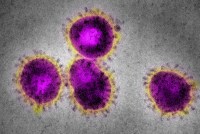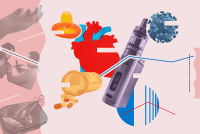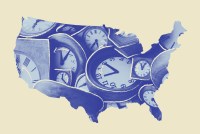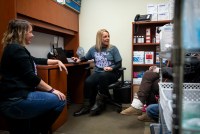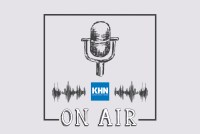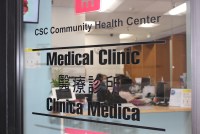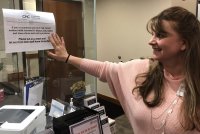Latest KFF Health News Stories
Growing Concerns Of Coronavirus Should Spur Plans – Not Panic – In The Workplace
Even in the event of an outbreak, employers have to follow certain rules in their efforts to protect employees from this virus.
They Fell In Love Helping Drug Users. But Fear Kept Him From Helping Himself.
Sarah and Andy fell in love while working to keep drug users from overdosing. But when his own addiction reemerged, Andy’s fear of returning to prison kept him from the best treatment.
As The Coronavirus Spreads, Americans Lose Ground Against Other Health Threats
Health care experts thought the battle was won against heart disease, measles, smoking, STDs and other life-threatening conditions and behaviors. Better think again.
Five Years Later, HIV-Hit Town Rebounds. But The Nation Is Slow To Heed Lessons.
In February 2015, an unprecedented HIV outbreak fueled by intravenous drug use hit the small city of Austin, Indiana. Under pressure, then-Gov. Mike Pence reluctantly allowed a syringe exchange. Five years later, HIV is undetectable in most of the outbreak patients. Still, the lessons haven’t been learned nationwide. Fewer than a third of the 220 counties deemed by the federal government as vulnerable to similar outbreaks have active syringe-exchange programs.
Facts Vs. Fears: Five Things To Help Weigh Your Coronavirus Risk
As the numbers of coronavirus fatalities and infections rise, the threat posed by the outbreak in China can seem frightening. But public health officials say the risk in the United States is low. Experts discuss some important issues that can help U.S. residents understand how the epidemic is unfolding.
Changing Clocks Is Bad For Your Health, But Which Time To Choose?
State legislatures are considering new bills proposing a permanent time standard instead of the spring-forward and fall-back clock changes. Most people want to stop adjusting clocks, but scientists and politicians are at odds over which time is better for society and our health.
Coronavirus Tests Public Health Infrastructure In The Heartland
While Missouri has yet to have a confirmed case of coronavirus, the threat of the disease is siphoning resources from an already stretched-thin public health system.
To Fight Chinese Outbreak, Doctors Deploy Drugs Targeting HIV, Malaria And Ebola
Chinese doctors and public health officials are turning to a variety of drugs as they seek an effective treatment for patients sickened by the novel coronavirus. The evidence behind some of these medicines is flimsy, researchers acknowledge, but human trials are the only way to know whether these drugs work.
Conservative Indiana Adopted Needle Exchanges But Still Faces Local Resistance
Indiana was ground zero for shifting ideas about needle exchanges after a small town had an HIV outbreak in 2015 brought on by needle-sharing. But even as other parts of the country start to embrace needle exchanges amid the ongoing opioid epidemic, the sites remain controversial in Indiana. Only nine of the state’s 92 counties have them, after a series of closures and reopenings.
How Lifesaving Organs For Transplant Go Missing In Transit
Scores of organs — mostly kidneys — are trashed each year and many more become critically delayed while being shipped on commercial airliners, a new investigation finds.
Listen: Which Is The Greater Threat — The Coronavirus Or The Flu?
Kaiser Health News reporter Liz Szabo talked to Connecticut Public Radio about the risks of the novel coronavirus compared with influenza.
As VA Tests Keto Diet To Help Diabetic Patients, Skeptics Raise Red Flags
The Department of Veterans Affairs is partnering with Virta Health, a California startup that offers remote coaching and monitoring for people with Type 2 diabetes to help them follow the ultra-low carbohydrate diet.
Public Health Officials Offer Scant Details On U.S. Coronavirus Patients
To date, the U.S. has multiple confirmed cases of the viral infection that originated in Wuhan, China. That includes cases in which the virus passed from person to person within this country. So why don’t health officials share more information with the public?
No Masking The Best Way To Avoid The Scary Coronavirus: Wash Your Hands
While covering the SARS outbreak as a reporter in China, KHN’s editor-in-chief saw that common sense is the best defense against viral illness.
Masks Reveal Cultural Disconnect As L.A.’s Chinese Community Braces For Coronavirus
Since two cases of the mysterious new coronavirus were reported in Southern California, Chinese immigrants have begun donning face masks. The practice is common in China but goes against official guidance in the U.S., and that’s causing conflict in local schools.
Response To Nation’s 1st Coronavirus Case Draws On Lessons From Measles Outbreak
When the first confirmed U.S. patient was pinpointed in Washington state, health clinic workers there weren’t rattled. They were prepped by new statewide protocols on contagion containment, in the wake of last year’s measles scare.
Must-Reads Of The Week From Brianna Labuskes
Newsletter editor Brianna Labuskes wades through hundreds of health care policy stories each week, so you don’t have to.
Something Far Deadlier Than The Wuhan Virus Lurks Near You
There is a virus that has already sickened at least 13 million Americans this winter, hospitalizing 120,000 and killing 6,600 people. You may even know of it.
Listen: How Vaping Regulations Are Playing Out In The States
KHN Midwest correspondent Lauren Weber joined Wisconsin Public Radio’s Rob Ferrett on “Central Time” to discuss the latest on vaping bans and what they mean for vaping trends among youth.
Employers’ Dream Of Controlling Health Costs Turns To Workers’ Sleep
Sleep is the latest in an ever-growing list of wellness issues — such as weight loss, exercise and nutrition — that firms are targeting to improve workers’ health and lower medical costs.



